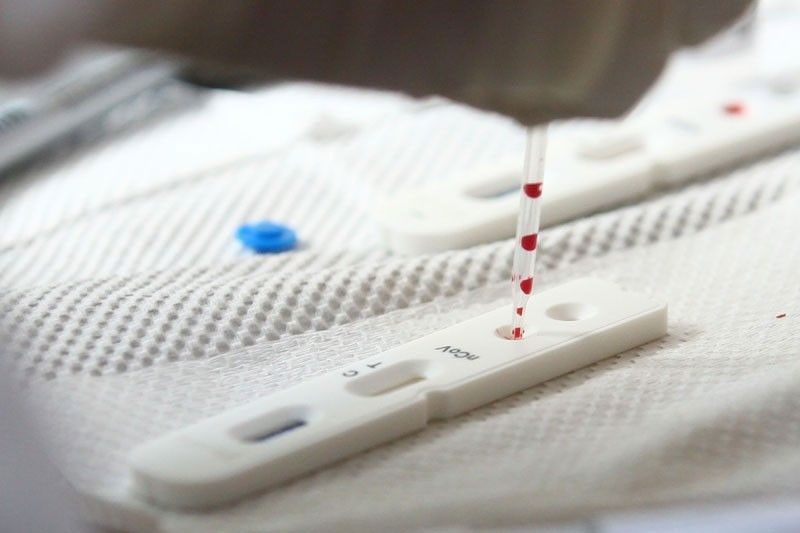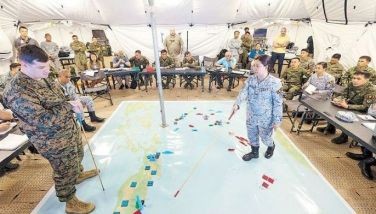Government eyes 10 million virus tests in 10-12 months

CLARK FREEPORT, Pampanga, Philippines — The government is eyeing 10 million virus tests within the next 10 to 12 months, with plans to cover “essential workers who are in frequent contact with crowds,” according to Vince Dizon, deputy chief implementer of the government’s coronavirus disease 2019 (COVID-19) response.
“The goal is to now do 10 million tests within the next 10-12 months, with plans to aggressively expand testing protocols to non-medical personnel, particularly to essential workers frequently in contact with large volumes of people,” Dizon said in a statement yesterday.
These essential workers, according to Dizon, include “security guards, cashiers, market and street vendors and transport sector workers as well as those in economic zones and priority tourist destinations.”
The development came as COVID-19 national action plan chief implementer Sec. Carlito Galvez Jr. cited the “urgent need to safely open the economy” while urging everyone to “work together in controlling the spread of COVID-19.”
“Though the lockdown bought us time to increase public health capacity, we now must face the challenge of reopening the economy,” Galvez said during a recent meeting with the private sector.
Galvez thanked the Task Force Test, Trace, Treat (T3) and its private sector partners for “coming together to ramp up the country’s overall testing capacity to 74,000 tests per day, with 75 labs and a turnaround time of just 72 hours or less for results.”
T3 is the collaboration of the Inter-Agency Task Force (IATF) on the Management of Emerging Infectious Diseases with the Department of Health (DOH), Asian Development Bank, Philippine Disaster Resilience Foundation and several dozen private organizations.
Its goal is to help ramp up the government’s testing, tracing and treatment efforts to beat COVID-19.
“It has been a challenging fight thus far, and we will continue to face these challenges head on through various efforts of the national and local governments and with the private sector as an invaluable partner in this fight. It is only by working together that we can again start to rebuild our lives and the economy,” Dizon said.
“We would not have been able to do all of these without the help of our partners in the private sector. This is why we humbly ask for continued partnership with the private sector to support the way forward to manage COVID-19 and keep the economy open safely for the benefit of every Filipino,” he added.
Epidemiological surveillance
The lack of epidemiological surveillance to monitor the spread of COVID-19 in real time is a clear indication of how health authorities are mishandling the pandemic response, Sen. Joel Villanueva said yesterday.
Villanueva, who chairs the Senate labor committee, expressed alarm over the rising number of COVID-19 cases in the country. He said the continued surge would ultimately prove disastrous to efforts of the government to restart the economy.
“Business confidence is tied with trust in health sector management. Industries and productive economic sectors won’t risk resuming operations if there is a strong possibility of another lockdown, which would be disastrous for our economy and consequently for our workers as well,” Villanueva said in a statement.
The senator added that the daily reports and figures issued by the DOH are “lacking” – the same with the efforts of the government to strictly enforce the general community quarantine.
The government must undertake random testing to determine the extent of infections in the country to protect the health of communities and the workforce to help sustain efforts for economic recovery, according to Villanueva.
“Our system of not having active monitoring is dangerous. We’re often surprised that there are outbreaks of COVID-19 cases in other places of the country, so there must be active surveillance of our communities, offices and workplaces,” he said.
The senator explained that epidemiological monitoring and surveillance gives authorities a clear picture of the situation on the ground, allowing them to deploy resources and tools to prevent the spread of the disease.
Efforts of the government to contain the disease could be described as passive surveillance, which the World Bank describes as “a system by which a health jurisdiction receives reports submitted from hospitals, clinics, public health units or other sources.”
While considered as an “inexpensive strategy to cover large areas,” passive surveillance could lead to discrepancies and delays in data, Villanueva said, citing the multilateral lender’s 2006 publication titled “Disease Control Priorities in Developing Countries.”
Instead of passive surveillance, the senator said the government should shift its strategy to active surveillance, where authorities seek out information in communities and use the data to tailor-fit the response – strategies that require more staffing, which should be beneficial for displaced workers.
“Our government should take a good hard look at its current strategy. The rising number of cases, especially in the past three days, should already be a red flag. We should make the necessary adjustments immediately because we cannot afford another lockdown,” he said.
“We have to slow down the spread of the disease because our healthcare system is close to being maxed out. At the same time, we need to restore the confidence of industries so they can resume operations and employ our workers back,” he added.
For Sen. Francis Tolentino, easing restrictions would help in reviving the economy, though he conceded that it may have repercussions on the rate of the spread of COVID-19.
If more industries will open, manufacturing will be revitalized along with tourism and jobs will be generated, according to Tolentino.
“We can recover a bit in the third quarter and in the fourth quarter, with the coming Christmas season, but in terms of health consequences, that will be difficult to determine,” he told reporters via video conference.
The senator said the strict enforcement of health protocols would make it easier to sustain efforts for economic recovery. Paolo Romero
- Latest
- Trending



























